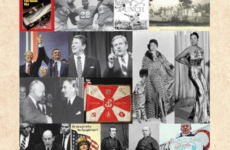By: Lauren Kane –
On Monday, September 30, Dr. Sally Gomaa, Associate Professor in Salve Regina’s Department of English, gave a presentation on her work translating the novel Nabidh ahmar, or Red Wine, by Amina Zaydan, from Egyptian to English. The presentation took place in the McKillop Library. The novel was originally published by the American University of Cairo Press in 2007, and the English translation was published in 2010. Gomaa was connected with Amina Zaydan and Red Wine through the AUC Press.
A native of Alexandria, Egypt, Gomaa began the presentation with the ALTA definition of translation, and a brief history of economics and politics in Egypt since the 1960’s, as it plays a large part in understanding the novel’s main character. She then went on to talk about her translation process.
This is the first translation project Gomaa has done. Her interest was sparked by international understanding that can come from such an endeavor. “Translation can play a major role in promoting intercultural communication and awareness. There are many misconceptions in the US about the people of the Middle East and vice versa. Translating literature is an important way to bridge the gap between these two worlds,” said Gomaa.
Gomaa took on the challenge, not really knowing what to expect. “I did not anticipate how long it would take or how hard it would be. But it was all the labor of love,” said Gomaa.
Now a translation veteran, Gomaa has confidence when looking back on the undertaking. Gomaa said, “This experience has so much increased my understanding of the nuances and undercurrents of literary style and my appreciation of the tremendous effort that goes into translation.”
With Egyptian as her first language, and English as her second, Gomaa understood the loss of rhythm and meaning that occurs during translation.
“There’s a price for translation. So much is lost. There’s no avoiding it.”
Red Wine is a novel told through the eyes of the main character, in the style of “stream of consciousness,” used by authors such as Virginia Woolf. In this postmodern style, the story is to be taken as an extended metaphor as opposed to a string of events. As described by Gomaa, “[stream of consciousness] follows the meandering of the human brain…poetic, mystical.”
Red Wine is a mainly feminist work, but there are other themes that tie in to the current turmoil in Egypt today.
“This is a feminist novel about the main character’s search for a voice of her own in the din of voices that seek to define or shape her. It is also a postmodern novel concerned with narrative and metaphor. On the other hand, the main character’s background and her penchant for victimhood address issues the author is critical of in Egyptian culture,” said Gomaa. “The novel speaks to us beyond the feminist level…there’s a complexity there that speaks to us as Egyptians.”
Red Wine was awarded the Naguib Mahfouz Medal for Literature in 2007. Gomaa is not currently working on another translation project, but plans to pursue more in the future.














